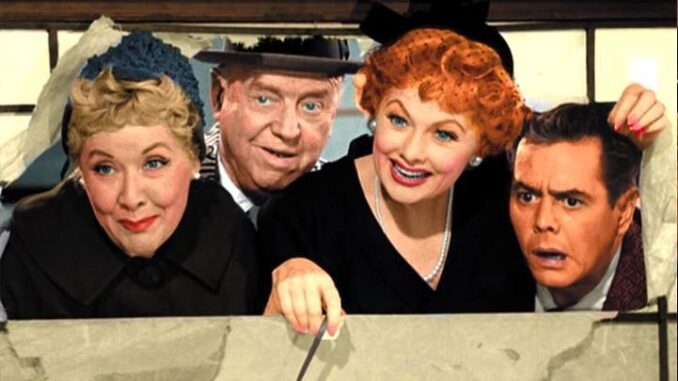
When I Love Lucy premiered in 1951, few could have predicted that the show—and its red-haired star, Lucille Ball—would redefine what it meant to be a woman in television. At the time, Hollywood was a man’s world. Women were often cast as sidekicks, love interests, or comic relief. But Ball was determined to do more than make people laugh; she wanted to reshape the very structure of television itself.
The Birth of a Groundbreaking Show
Lucille Ball had been a familiar face in Hollywood long before I Love Lucy. She spent years in B-movies, earning the nickname “Queen of the Bs.” Yet despite her comedic talent, she struggled to find roles that truly showcased her abilities. That changed when CBS offered her a chance to adapt her hit radio show, My Favorite Husband, for television.
However, Ball had one condition: her real-life husband, Desi Arnaz, had to play her on-screen spouse. The network hesitated, believing audiences wouldn’t accept an interracial couple (Ball was white, Arnaz was Cuban). But Ball stood firm. Her insistence not only kept her marriage strong but also broke early television’s unspoken rules about race, culture, and representation.
Revolutionizing Television Production
When CBS finally agreed, Ball and Arnaz didn’t just make a sitcom—they revolutionized the way television was made. The couple founded Desilu Productions, which became a powerhouse studio responsible for innovations still used today.
They pioneered the three-camera filming technique, which allowed for live studio audiences, multiple angles, and seamless editing—creating the vibrant, dynamic energy that defined I Love Lucy. This method became the gold standard for sitcoms, influencing shows from Friends to The Big Bang Theory.
Ball and Arnaz also made the groundbreaking decision to film in front of a live audience, capturing authentic laughter and emotional reactions. It gave the show a unique rhythm and intimacy that scripted comedies rarely achieved.
Comedy with Courage
At its heart, I Love Lucy was more than slapstick—it was storytelling rooted in humanity. Lucy Ricardo, Ball’s character, was a housewife with big dreams, constantly finding herself in hilarious predicaments while trying to break free of domestic limitations.
From her infamous chocolate factory meltdown to her disastrous attempt at grape stomping, Lucy’s comedic genius came from her vulnerability and determination. She made mistakes, failed spectacularly, and got back up again—something millions of women watching from home could relate to.
In many ways, Lucy Ricardo became a mirror of American womanhood in the 1950s: confined by expectations yet longing for freedom and purpose. Ball infused the role with heart, showing that comedy could be both entertaining and subversive.
Breaking Barriers for Women in Hollywood
Behind the laughter, Lucille Ball was making history as one of the first female studio heads in Hollywood. After buying out Arnaz’s share of Desilu Productions in 1962, she became the first woman to run a major television studio.
Under her leadership, Desilu greenlit several iconic shows—including Star Trek and Mission: Impossible. These decisions cemented her legacy not only as a performer but as a visionary businesswoman who understood the future of entertainment.
Ball’s success opened doors for women across the industry, proving that creative and executive leadership weren’t limited by gender. She turned comedy into empowerment, showing that women could command both the stage and the studio.
The Enduring Legacy
More than seven decades after its debut, I Love Lucy remains a cultural touchstone. Its episodes are still syndicated worldwide, its catchphrases are quoted daily, and its influence is woven into the DNA of modern sitcoms.
But Lucille Ball’s impact goes far beyond television technique. She changed how audiences viewed women on screen—allowing them to be funny, flawed, ambitious, and unapologetically themselves.
Her comedic timing inspired generations of performers, from Carol Burnett to Tina Fey, and her courage in business paved the way for today’s female producers and showrunners.
Even in today’s fast-paced streaming world, I Love Lucy stands as a reminder of what happens when creativity meets courage. The laughter may feel nostalgic, but the message remains timeless: women belong everywhere—in front of the camera, behind it, and at the head of the table.
A Legacy Written in Laughter
Lucille Ball didn’t just change television; she transformed it into a platform where women could be seen, heard, and celebrated. Her journey from an underestimated actress to a media mogul mirrors the evolution of women’s roles in entertainment itself.
As Ball once said, “I’m not funny. What I am is brave.” That bravery built an empire of laughter—and an enduring legacy that continues to inspire every dreamer who dares to color outside the lines.
